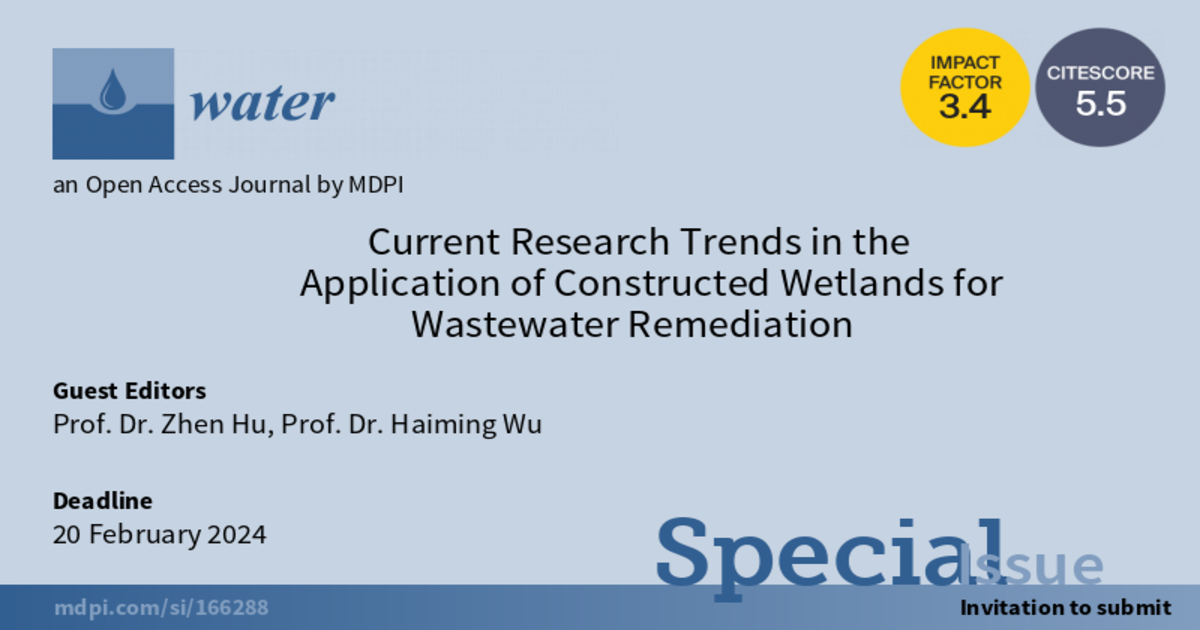Current Research Trends in the Application of Constructed Wetlands for Wastewater Remediation
A special issue of Water (ISSN 2073-4441). This special issue belongs to the section "Wastewater Treatment and Reuse".
Deadline for manuscript submissions: closed (20 February 2024) | Viewed by 2920

Special Issue Editors
Interests: advanced purification; wastewater reuse; constructed wetland; biologial nitrogen removal; greenhouse gases; emerging contaminants; resource and energy recovery
Special Issues, Collections and Topics in MDPI journals
Interests: constructed wetland; wastewater treatment; emerging pollutants removal; biochar; microplastic; wetland biogeochemistry
Special Issues, Collections and Topics in MDPI journals
Special Issue Information
Dear Colleagues,
Nowadays, increased levels of water consumption, and correspondingly high levels of pollution, have made water remediation essential for sustainable development. Constructed wetlands (CWs) are one of the most promising eco-technologies for water remediation, with proven efficiency and applications in both rural to urban, and even industrial, areas. The principles and influencing factors for pollutant removal of CWs have been extensively discussed, and various approaches have been conducted by researchers and practitioners to improve its treatment capacity and efficiency. Recently, CWs have faced new challenges, such as the removal of emerging pollutants, e.g., antibiotic, microplastic, and some persistent organic pollutants (POPs). Additionally, the query on the function of CWs in high latitude areas and its performance after long term operation are still issues of concern in the industry. Moreover, the public focus on the extreme climate events occurring in many parts of the globe also demand a rethinking of the ecological benefit of CWs.
Thus, we would like to invite you to provide comprehensive, up-to-date insight into recent trends and advances in the application of constructed wetlands for water remediation. We foresee that the papers compiled in this important Special Issue of Water would contribute to the further development and wider application of CWs as reliable and robust solutions for water remediation.
Prof. Dr. Zhen Hu
Prof. Dr. Haiming Wu
Guest Editors
Manuscript Submission Information
Manuscripts should be submitted online at www.mdpi.com by registering and logging in to this website. Once you are registered, click here to go to the submission form. Manuscripts can be submitted until the deadline. All submissions that pass pre-check are peer-reviewed. Accepted papers will be published continuously in the journal (as soon as accepted) and will be listed together on the special issue website. Research articles, review articles as well as short communications are invited. For planned papers, a title and short abstract (about 100 words) can be sent to the Editorial Office for announcement on this website.
Submitted manuscripts should not have been published previously, nor be under consideration for publication elsewhere (except conference proceedings papers). All manuscripts are thoroughly refereed through a single-blind peer-review process. A guide for authors and other relevant information for submission of manuscripts is available on the Instructions for Authors page. Water is an international peer-reviewed open access semimonthly journal published by MDPI.
Please visit the Instructions for Authors page before submitting a manuscript. The Article Processing Charge (APC) for publication in this open access journal is 2600 CHF (Swiss Francs). Submitted papers should be well formatted and use good English. Authors may use MDPI's English editing service prior to publication or during author revisions.
Keywords
- constructed wetland
- water remediation
- purification
- sustainable development
- emerging pollutants
- climate change
Benefits of Publishing in a Special Issue
- Ease of navigation: Grouping papers by topic helps scholars navigate broad scope journals more efficiently.
- Greater discoverability: Special Issues support the reach and impact of scientific research. Articles in Special Issues are more discoverable and cited more frequently.
- Expansion of research network: Special Issues facilitate connections among authors, fostering scientific collaborations.
- External promotion: Articles in Special Issues are often promoted through the journal's social media, increasing their visibility.
- e-Book format: Special Issues with more than 10 articles can be published as dedicated e-books, ensuring wide and rapid dissemination.
Further information on MDPI's Special Issue policies can be found here.






